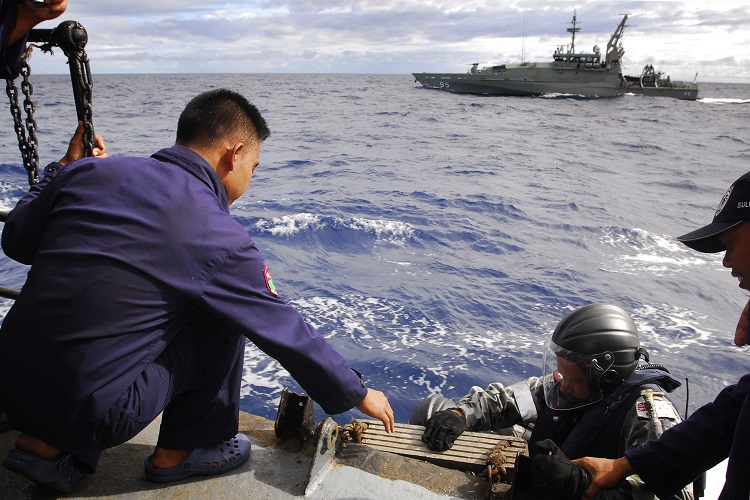Jokowi’s waves of opportunity
 Today ASPI has released Waves of opportunity: Enhancing Australia–Indonesia maritime security cooperation. The full report can be found here [PDF].
Today ASPI has released Waves of opportunity: Enhancing Australia–Indonesia maritime security cooperation. The full report can be found here [PDF].
At the recent East Asia Summit (EAS), Indonesia’s President Joko ‘Jokowi’ Widodo spoke about Indonesia’s new maritime doctrine, the ‘World Maritime Axis’ concept. But what does that mean? Some criticise the term for its negative connotations, as in ‘axis powers’, or ‘axis of evil’. Perhaps it’s more apt to describe it as a ‘pivot’, as the US ‘rebalance’ used to be termed.
The World Maritime Axis highlights that ‘the sea is becoming more important for our future’, wrote Jokowi. Indonesia is increasingly aware of its central location along the sea lanes that connect two strategic oceans, the Indian and Pacific. Hence, Jakarta has warmly embraced the term ‘Indo-Pacific’ not only as diplomatic jargon [PDF], but as strategic comprehension.
But the important shift isn’t just maritime. Rather, it’s how Indonesia views its surrounding geography. Indonesia has traditionally looked north and east toward the Pacific, for economic, diplomatic and strategic reasons in its engagements with ASEAN and the major powers, including the US. The World Maritime Axis aims to give greater attention to the less-understood, but no less important, Indian Ocean in Jakarta’s mental map [PDF].
That brings Australia (and India) into the equation. The Indian Ocean, including the Timor Sea, has been known as a sea of troubles due to challenges ranging from people smuggling and illegal fishing, to more strategic Chinese submarine forays and the security of its maritime choke-points—including the Malacca, Sunda, and Lombok Straits. No countries are better poised to address challenges to those vital waterways than Australia and Indonesia [PDF].
Maritime security cooperation can therefore support some, if not all, of the five pillars of the World Maritime Axis concept: rebuilding the maritime culture; enhancing the maritime economy (especially the fishing industry); improving maritime infrastructure and connectivity (through the ‘sea highway’ proposal); engaging in maritime diplomacy (such as the chairmanship of IORA); and strengthening maritime defence.
First, trust must be built between policymakers. Cooperation can be both a way to build and maintain trust and an end in itself. Trust-building can start from personal ties between policymakers at both strategic and operational/tactical levels to underpin the formal consultative and dialogue processes, such as the Indonesia-Australia Defence Strategic Dialogue, annual leaders’ meeting, and the 2+2 foreign and defence ministers’ meeting. Institutionalising personal ties, such as those facilitated by the Ikatan Alumni Pertahanan Indonesia-Australia (IKAHAN), is useful but could be more so if expanded to include civilian counterparts, such as law-enforcement officials. With trust anything is possible. Both countries could discuss their individual—and potentially their collective—plans to prevent or counter the threat of force in territorial disputes, such as in the South China Sea.
Second, there’s an apparent need to streamline institutional stove-piping and bureaucracies responsible for cooperation. Cooperation currently takes a siloed form: each agency responsible does its own thing. The problem partly lies in Indonesia’s multiple, but poorly coordinated, maritime-security agencies. The Badan Koordinasi Keamanan Laut (Maritime Security Coordinating Agency, BAKORKAMLA) is supposedly responsible for coordinating 12 agencies. But competition among some of them has stymied operations and precipitated turf battles. As such, BAKORKAMLA will soon become the Badan Keamanan Laut (Maritime Security Agency, BAKAMLA) as Indonesia’s new Coastguard so that it can gain a command authority. Even then, overlaps and duplication of roles will still exist. Under National Law No. 32/2014 on Marine Affairs, BAKAMLA would be responsible for patrols, search and rescue, and law enforcement, similar to other agencies such as Marine Police and Transport Ministry’s Sea and Coast Guard Unit (KPLP). That necessitates major legal and institutional reforms. The formation of the Australian Border Force (ABF) [PDF] next year could give Indonesia useful insights on the Australian experience in streamlining multiple agencies responsible for maritime security.
Third, while Indonesia still lacks the capacity to secure its waters effectively, Australian assistance needs to be recalibrated. Rather than giving hardware assets, assistance should be aimed toward improving Indonesia’s maritime security policymaking and assisting Indonesia to contribute more in regional maritime security. Australia can offer education and training opportunities for BAKAMLA’s officials, while simultaneously planning for future BAKAMLA-ABF exercises. Such training could be jointly conducted in other countries, such as Timor-Leste [PDF].
Fourth, the ultimate achievement of security cooperation should be maritime domain awareness (MDA) along the maritime boundary. MDA is essentially a comprehensive understanding about what’s happening over, on, and under the sea and along the littoral. Australia has voiced support for Indonesia’s National Maritime Security Information Center. That Center could support surveillance and information-sharing cooperation between Australia and Indonesia.
Finally, Indonesia can engage in joint tri-service military exercises with Australia, both to increase interoperability and to make our two armed forces more comfortable about working together in a joint environment. Submarine search and rescue might be another opportunity to add weight to bilateral cooperation.
Notwithstanding those opportunities, old problems remain and new ones can arise. For Indonesia, it remains to be seen whether the President can promote his ideas beyond the circle of advisers and ministers. He must convince the skeptics in the parliament, the bureaucracy, and the public that the World Maritime Axis concept is indeed what Indonesia needs to navigate the Indo-Pacific century.
Ristian Atriandi Supriyanto is an associate research fellow in the RSIS Maritime Security Programme and author of Waves of opportunity: Enhancing Australia–Indonesia maritime security cooperation. Image courtesy of Department of Defence.


 Image of Donald Trump: Getty Images.
Image of Donald Trump: Getty Images.